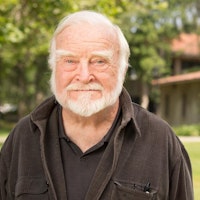When we choose a goal and invest ourselves in it to the limits of concentration, whatever we do will be enjoyable. And once we have tasted this joy, we will redouble our efforts to taste it again. This is the way the self grows.
Mihaly Csikszentmihalyi

The Self Grows
Topic: Spiritual Growth & Practice
It is when we act freely, for the sake of the action itself rather than for ulterior motives, that we learn to become more than what we were. When we choose a goal and invest ourselves in it to the limits of concentration, whatever we do will be enjoyable. And once we have tasted this joy, we will redouble our efforts to taste it again. This is the way the self grows.
Mihály Csíkszentmihályi was born on September 29, 1934, in Fiume, Italy (now Rijeka, Croatia). Growing up during World War II, he experienced the hardships of the era, including being imprisoned as a child in Italy. These early experiences shaped his interest in understanding what makes life meaningful. At 22, after completing his secondary education in Rome, he immigrated to the United States and pursued psychology at the University of Chicago, where he earned both his B.A. in 1959 and his Ph.D. in 1965.
Csíkszentmihályi is best known for his concept of "flow," the state of complete immersion in an activity, often experienced during creative or challenging tasks. His interest in psychology began after hearing Carl Jung speak, which led him to explore the psychological aspects of creativity and happiness. His research showed that people often found fulfillment not from the outcome of their work but from the process itself. His book Flow: The Psychology of Optimal Experience (1990) became a key work in the study of human well-being.
Throughout his career, Csíkszentmihályi’s work contributed to the field of positive psychology, focusing on how people can lead more fulfilling lives. His studies, including the well-known "Experience Sampling Study," demonstrated that people were happier when engaged in tasks that challenged them just enough. Csíkszentmihályi authored many books and articles on creativity and happiness, leaving behind a legacy that continues to inspire people to find meaning in their daily activities. He passed away on October 20, 2021.
Flow: The Psychology of Optimal Experience
Mihály Csíkszentmihályi, Flow: The Psychology of Optimal Experience, January 1, 1990 by Harper Perennial

Mihaly Csikszentmihalyi
Theme: Spiritual Growth

About This Mihály Csíkszentmihályi Quotation [Commentary]
Mihály Csíkszentmihályi explores how deep concentration leads to both joy and growth. He explains, “when we choose a goal and invest ourselves in it to the limits of concentration, whatever we do will be enjoyable.” This enjoyment is not dependent on external rewards but emerges from being fully engaged in the activity itself. His concept of “flow” describes this state, where distractions fade, time seems to slow, and we are absorbed in the present moment. In such experiences, effort feels effortless, and the work itself becomes meaningful.
He emphasizes that true growth happens when we act freely, without ulterior motives, and dedicate ourselves to the process. “When we act freely, for the sake of the action itself rather than for ulterior motives, we learn to become more than what we were.” In this way, personal development is not about external achievement but about aligning with what deeply engages us. The satisfaction we find in such moments naturally encourages us to “redouble our efforts to taste it again,” reinforcing a cycle of learning and self-expansion.
“This is the way the self grows,” Csíkszentmihályi concludes, showing that meaningful engagement fuels ongoing transformation. Each time we experience this focused joy, we expand our abilities, making growth a continuous process rather than a final destination. When we commit to what truly engages us, we do more than improve—we evolve, shaped by the joy of being fully present in our chosen pursuits.
Mihály Csíkszentmihályi, Flow: The Psychology of Optimal Experience
Psychologist Mihaly Csikszentmihalyi’s groundbreaking research on “optimal experience” has uncovered “flow,” a state of consciousness which lies at the heart of genuinely satisfying experiences. During flow, individuals become fully immersed in an activity, experiencing deep enjoyment, heightened creativity, and a profound sense of engagement with life. This state is characterized by complete focus, loss of self-consciousness, and a distorted sense of time. Csikszentmihalyi’s work demonstrates that flow is not merely a matter of chance but can be deliberately cultivated and controlled. In his seminal book “Flow: The Psychology of Optimal Experience,” he outlines how we can harness this powerful state by strategically managing the information entering our consciousness, thereby unlocking our true potential, discovering authentic happiness, and significantly enhancing our overall quality of life. The key to achieving flow lies in striking a delicate balance between the complexity of a challenge and our skill level, ensuring that tasks are neither too easy nor too difficult.
―Mihály Csíkszentmihályi, Flow: The Psychology of Optimal Experience, January 1, 1990 by Harper Perennial
Additional Mihály Csíkszentmihályi Quotations
Resources
Related Quotes
Copyright © 2017 – 2026 LuminaryQuotes.com About Us